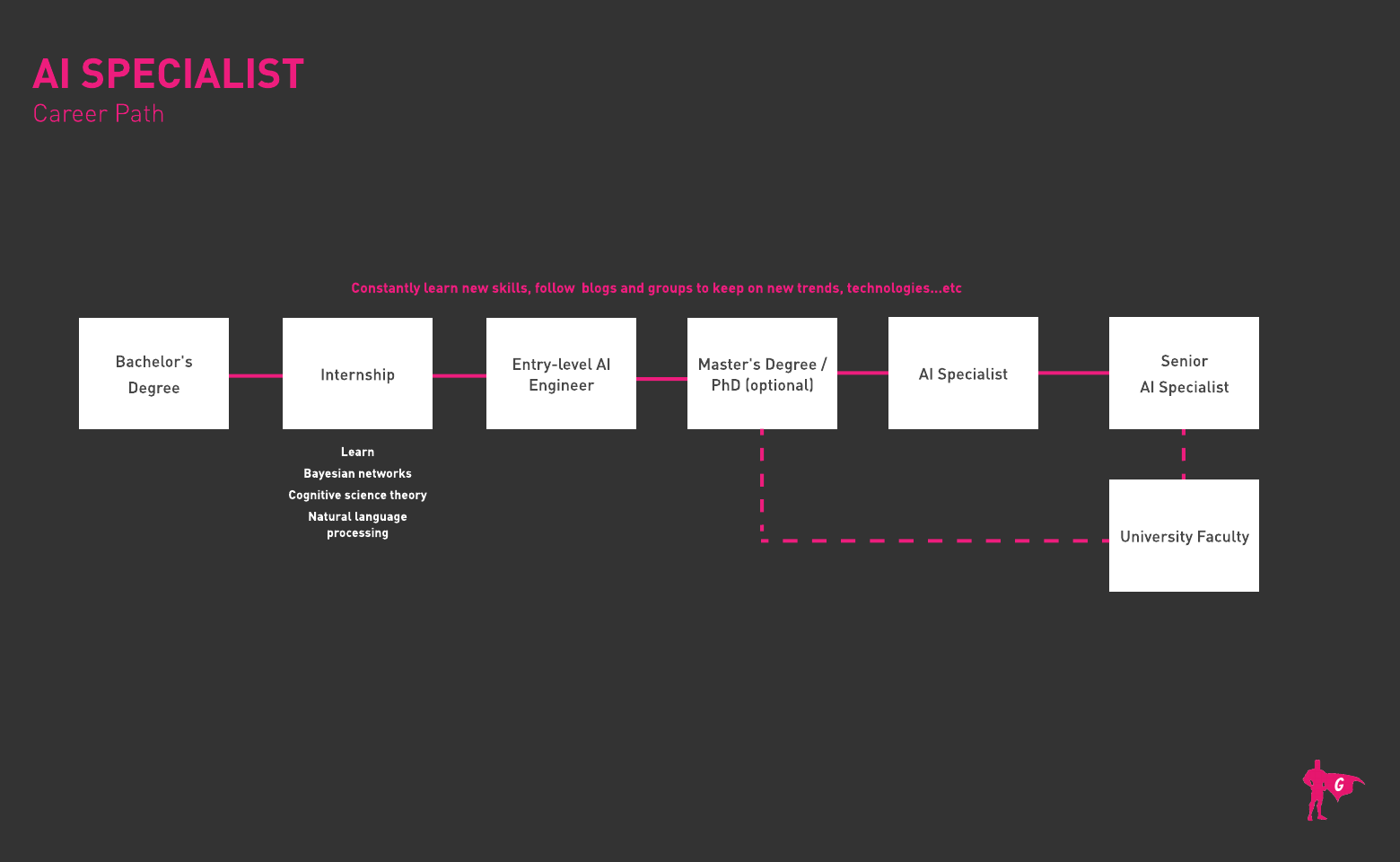Mga spotlight
Machine Learning Engineer, Data Scientist, Artificial Intelligence Developer, AI Software Engineer, Deep Learning Engineer, AI Systems Engineer, Cognitive Computing Engineer, Robotic Process Automation Engineer, Natural Language Processing Engineer, Computer Vision Engineer, AI Research Engineer
Ang paniwala ng tulad ng tao na katalinuhan na umiiral sa loob ng mga makina ay nasa loob ng halos 150 taon. Gaya ng maaari mong asahan, ang ideya ay ipinakilala sa isang kathang-isip na konteksto (sa 1872 nobelang Erewhon). Gayunpaman, ang artificial intelligence, o AI, ay naging isang katotohanan sa loob ng ilang panahon ngayon. Maaari naming pasalamatan ang visionary mind ni Alan Turing, ang sikat na World War II codebreaker, para sa modernong paggalugad ng machine intelligence at ang pagtulak upang matuklasan ang mga limitasyon nito.
Ang Mga Espesyalista sa Artipisyal na Katalinuhan ay nasa unahan ng kilusang ito sa computer science na naglalayong turuan ang mga computer na mag-isip at makipag-ugnayan sa mga tao sa paraang pantao. Ngayon, ginagamit ng aming mga device ang AI para sa speech recognition at para makipag-ugnayan sa amin bilang mga virtual assistant. Kinikilala ng AI ang ating mga mukha, boses, at fingerprint. Ito ay hinuhulaan at nagmumungkahi, sinasala ang mga resulta ng paghahanap sa online, ini-scan ang aming mga email para sa spam, nagsasalin ng mga wika, at nagpapatakbo ng mga makina. Karamihan sa atin ay nakikipag-ugnayan sa kamangha-manghang tech na ito araw-araw nang hindi iniisip ang tungkol dito, o sa ilang mga kaso kahit na napagtatanto ito.
Mayroong, siyempre, mga mapagkakatiwalaang alalahanin tungkol sa AI at ang mabilis na pag-unlad nito. Sa katunayan, nahaharap ngayon ang mga AI Specialist sa totoong problema ng etika ng AI. Ang isang potensyal na etikal na dilemma na sinasaliksik ay, paano natin mapoprotektahan ang ating sarili mula sa "AI bias" habang bumubuo tayo ng teknolohiyang mas mabilis at mas matalino kaysa sa sarili nitong mga tagalikha? Ang isang nakakatakot na kahihinatnan ng pagbuo ng AI na mas advanced kaysa sa amin ay ang pagkawala ng kontrol sa mga intelligent system...at hindi kanais-nais na mga kahihinatnan pagkatapos nito!
- Paggawa sa mga makabagong teknolohiyang nagbabago sa mundo
- Pinapadali ang pang-araw-araw na buhay para sa milyun-milyong gumagamit ng AI (sa pamamagitan ng mga device, atbp.)
- Pagtulong sa mga negosyo na maging mas mapagkumpitensya
- Paglikha ng mga bagong koneksyon sa pagitan ng AI at ng Internet of Things (IoT)
- Pagpapalaki ng medikal na kasanayan, potensyal na nagliligtas ng mga buhay at pagpapabuti ng kalusugan
- Pagbuo ng mga solusyon sa AI para sa pagpapatakbo ng walang sasakyang sasakyan
Oras ng trabaho
Ang mga Artificial Intelligence Specialist ay nagtatrabaho ng full-time, kadalasan sa loob ng bahay ngunit ang ilang trabaho ay nagsasangkot ng mga aktibidad sa labas. Kapag ang isang programa o sistema ay hindi gumana, ang employer ay maaaring makipag-ugnayan sa mga manggagawa para sa tulong upang mapatakbo muli ang mga bagay nang tama.
Mga Karaniwang Tungkulin
- Ang mga AI Specialist ay nagtatrabaho sa isang malawak na larangan, kaya ang mga indibidwal na tungkulin ay nakadepende sa employer at sa partikular na tungkuling tinanggap ng manggagawa.
- Ang ilang mga espesyalista ay nagtatrabaho sa mga spam blocker at plagiarism checker
- Ang iba ay maaaring bumuo ng mga serbisyo sa pagsasalin ng wika gaya ng Google Translate
- Ang iba pang mga karaniwang tungkulin na umaasa sa tungkulin ay maaaring kabilang ang:
- Cognitive simulation modeling
- Lumikha ng mga inilapat na AI program para matukoy at masubaybayan ang mga tao batay sa pagkilala sa mga tampok ng mukha, boses, fingerprints, gait detection, tibok ng puso, at iba pang salik
- Bumuo ng mga programa upang mangalap at bigyang kahulugan ang data at impormasyon, makita ang mga pattern, gumamit ng mga resulta upang matukoy ang mga solusyon sa mga problema at gumawa ng mga desisyon
- Gumawa ng software upang matulungan ang mga medikal na propesyonal na mag-diagnose ng mga pasyente
- Pahusayin ang mga chatbot na nagbibigay ng payo
- Isulong ang teknolohiya para sa paghahanap ng hindi pa natutuklasang likas na yaman
- Sumulat ng mga programa upang kontrolin (auto-pilot) ang mga sasakyang walang sasakyan para sa maraming layunin
Karagdagang Pananagutan
- Itulak ang sobre sa paglikha ng mas matalinong mga AI system na maaaring mangatuwiran at matuto at kahit na i-program ang kanilang sarili at iba pang AI
- Pagbutihin ang mga programa na gayahin ang mga pattern ng boses ng tao
- Magtrabaho sa AI para tumulong sa mga legal at pinansyal na sektor
- Makipagtulungan sa mga panlabas na kliyente at stakeholder
- Manatiling nakasubaybay sa mga pag-unlad; dumalo sa mga kaganapan at kumperensya ng propesyonal na organisasyon
Soft Skills
- Pansin sa detalye
- Pakikipagtulungan
- Pagkamalikhain
- pasensya
- Nakatuon sa layunin
- Lubos na organisado
- Mausisa at mausisa
- Mga kasanayan sa paglutas ng problema
- Nakatuon sa proseso
- Malakas na kasanayan sa komunikasyon
- Magagawang ipaliwanag ang mga kumplikadong isyu sa mas simpleng mga termino
Teknikal na kasanayan
- Kaalaman sa maraming wika ng computer programming
- Pagsusuri ng mga sistema
- Natural na Pagproseso ng Wika
- Mga neural network
- Mga mahuhusay na kasanayan sa matematika, kabilang ang calculus, linear algebra, at mga istatistika
- Background ng computer science
- Malakas na pamilyar sa cognitive science
- Pamilyar sa antropolohiya, pilosopiya, at sikolohiya
- Mga korporasyon/pribadong-sektor na kumpanya
- Mga ahensya ng gobyerno/militar
- Industriya ng pangangalagang pangkalusugan
- Mga institusyong mas mataas na edukasyon
- Mga sentro ng pananaliksik at pagpapaunlad
- Mga organisasyong pang-agham
- Industriya ng sasakyan at transportasyon
Bago ibigay ng sangkatauhan ang mga susi ng lipunan sa AI, dapat nating tiyaking gumagana ito sa paraang nilalayon nating gumana ito. Sa itaas, binanggit namin ang ilang alalahanin na nauugnay sa etika ng AI. Ngunit marami pang mga inaasahan na may pananagutan ang mga AI Specialist na matugunan. Inatasan silang lumikha ng mga programa upang mag-isip tulad ng mga tao, gayunpaman ang katotohanan ay ang AI ay nagpapatakbo nang hindi makalkula nang mas mabilis kaysa sa amin para sa maraming mga pag-andar, at maaaring hindi mahulaan minsan.
Ano ang mangyayari kapag nagkamali ang isang AI (o kung ano ang itinuturing ng mga tao na isang pagkakamali, ngunit lohikal sa AI?). Ang mismong problemang iyon ay marahil pinakamahusay na inilalarawan noong 2001: Isang Space Odyssey, nang ang AI na nasa sasakyang kalawakan ay nagpasya na ang tanging paraan upang makumpleto ang naka-program na misyon nito ay ang wakasan ang mga taong sinusubukang i-abort ang misyon.
Sa kabutihang-palad, ang mga Espesyalista ng Artipisyal na Katalinuhan ay naisip na ang isa na iyon. Ang mga sitwasyong ito ay maaaring mukhang science fiction ngunit ang mga hypothetical na problema ay sineseryoso. Kung sakupin ng masamang AI ang Earth para sirain ang lahat ng tao, ang mga AI Specialist ang masisisi (bagaman hindi nagtagal, malinaw naman)!
Seryoso, ang ilan sa mga pinakamainit na kasalukuyang trend ay mga isyu sa etikal na AI. Ang madalas na binabanggit na Singularity ay isang malaking hamon na pinag-aaralan ng mga eksperto na gustong matiyak na maingat nating nilalapitan ang naturang kaganapan. Para sa mga hindi pa nakakarinig nito, ang Singularity ay isang hypothetical na kaganapan sa hinaharap kung saan ang AI ay naging napaka-advance na hindi namin makontrol o mahulaan kung ano ang susunod nitong gagawin. Sa madaling salita, sinakop ng prangkisa ng The Terminator ang paksang ito sa kathang-isip na pagtaas ng Skynet, isang military defense AI system na naka-network sa aming mga sistema ng armas. Ito ay "pagkakamalayan sa sarili" ay naging isang kaganapan sa Singularity dahil kinuha nito ang kontrol sa aming mga nuclear missiles at iba pang mga makina upang maging isang hindi mapigilan na kalaban.
Bukod sa pagpigil sa isang dystopian na hinaharap, kabilang sa iba pang mga uso sa industriya ng AI ang pagtaas ng cybersecurity upang hindi ma-hack ng mga tao ang mga AI system, ang pagdating ng AI-enabled chips, pagpapalaki ng mga koneksyon sa pagitan ng AI at ng Internet of Things, automated machine learning, at AI sa mundo ng cloud computing.
Ito ay malamang na hindi sinasabi, ngunit ang mga Espesyalista ng AI ay malamang na mga tagahanga ng sci-fi noong mga bata pa sila. Ang science fiction ay naglantad sa mga henerasyon sa tila walang katapusang mga posibilidad kung ano ang kaya ng mga computer program. Bagaman ang karamihan sa AI ay hindi gumagana sa loob ng isang robotic host (pa), umabot na ito sa punto na hinulaan ng maraming manunulat taon na ang nakalilipas (Eugene Goostman, isang AI chatbot na nilikha ng tatlong programmer sa Saint Petersburg, Russia noong 2001 ay malawak na itinuturing na lumipas na. ang fabled Turing Test, ibig sabihin ay maaaring lokohin ng AI ang mga tao na nakikipag-usap dito).
Ngunit ang mga mahilig sa AI ay dapat ding magkaroon ng mga namumukod-tanging matitigas na teknikal na kasanayan upang sumama sa mga malikhain, puno ng pangarap na mga isip. Ang mga manggagawa sa larangang ito ay malamang na nag-aral nang mabuti sa paaralan, nagsaliksik, na-format nang maayos ang kanilang mga papel, at nagbigay-pansin sa mga detalye. Sila ay malamang na napaka-lohikal at layunin, nakatuon sa mga resulta, at independyente. Sa katunayan, tulad ng maraming mga propesyonal sa IT sa kanilang mga kabataan, ang mga Espesyalista ng AI ay kadalasang nasisiyahang magtrabaho nang mag-isa at sa loob ng bahay nang mahabang panahon, na nakatuon sa mga gawaing nasa kamay o marahil ay nawala sa isang mundo ng code.
- Ang mga Entry-level AI Specialist ay dapat magkaroon ng hindi bababa sa isang bachelor's, karaniwang sa computer science o isang kaugnay na major (o kahit isang interdisciplinary degree tulad ng cognitive science)
- Maraming manggagawa ang maaaring kumpletuhin ang isang graduate degree bago magsimula sa trabaho, o tapusin nila ang isa habang nagtatrabaho sa industriya
- Maaaring kabilang sa mga advanced na degree major ang antropolohiya, pilosopiya, sikolohiya, o psycholinguistics
- Ang AI ay isang malawak na larangan, ngunit ang karaniwang coursework ay maaaring kabilang ang:
- Algebra, algorithm, calculus, logic, probability, at statistics
- Mga network ng Bayesian
- Teorya ng agham na nagbibigay-malay
- Mga wika sa computer programming/coding
- Engineering
- Graphical modeling (neural nets)
- Physics
- Robotics
- Natural na Pagproseso ng Wika
- Pagsusuri ng mga sistema
- Ang mga programang partikular sa AI ay ang pinakamahusay na mapagpipilian kung mahahanap mo ang mga ito. Kung hindi, maghanap ng mga programa na nag-aalok ng mga kurso sa mga lugar na nakalista sa itaas
- Ang gastos ay palaging isang pagsasaalang-alang. Ang pangalan ng unibersidad sa iyong diploma ay isang bagay na titingnan ng mga employer, ngunit sa huli, ang iyong mga kwalipikasyon ang magbibigay sa iyo ng trabaho
- Maghanap ng mga programang naglilista ng mga istatistika sa pagpapanatili ng mag-aaral, o subukang maghanap ng mga pagsusuri ng mag-aaral sa programa at/o guro.
- Ano ang ratio ng estudyante-sa-faculty? Ang AI ay isang kumplikadong larangan ng pag-aaral, kaya kakailanganin mo ng sapat na atensyon mula sa iyong mga guro, kapag kailangan mo ng tulong o may mga tanong.
- Ang mga pasilidad ng pagpopondo at pananaliksik ay isang malaking pagsasaalang-alang. Ang pagtatrabaho sa Artipisyal na Katalinuhan ay nangangailangan ng isang toneladang pagsasanay!
- Ang pinakamahusay na mga paaralan ay karaniwang kumukuha ng pinakamalaking panlabas na pagpopondo ngunit tiyaking ginagamit ito upang makinabang sa pag-aaral ng mag-aaral
- Basahin ang mga talambuhay ng guro! Kadalasan, kakaunti ng mga guro ang bubuo sa karamihan ng iyong mga karanasan sa AI-learning, kaya huwag lang tumuon sa paaralan kundi pati na rin sa mga tao.
- Sa pagsasalita tungkol sa mga tao, anong uri ng mga AI club at organisasyon ng mag-aaral ang nasa campus? Gaano sila kaaktibo? Mayroon ba silang anumang mga tagumpay na kinikilala sa bansa?
- Kung nag-enroll sa isang IT degree, tingnan kung ang programa ay akreditado ng ABET
- Isaalang-alang ang mga online na programa, kung magagawa, ngunit tandaan na ang personal na pagdalo ay maaaring lubos na mapahusay ang karanasan sa pag-aaral para sa maraming mga kurso. Minsan ang isang hybrid na programa ay isang perpektong kompromiso!
Ang 40 Pinakamahusay na Kolehiyo ng Great Values Colleges sa US para sa Artipisyal na Katalinuhan ay may malakas na listahan ng mga paaralan para sa mga undergrad na programa. Gayundin, tingnan ang Pinakamahusay na Mga Paaralan sa Computer Science ng US News at Pinakamahusay na Mga Programang Artipisyal na Katalinuhan. Gaya ng nabanggit, hindi lahat ng AI Specialist ay nakakakumpleto ng mga degree sa AI o computer science, ngunit ang mga listahang ito ay dapat makapagsimula sa iyo!
- Dapat matutunan ng mga mag-aaral sa high school ang lahat ng kanilang makakaya bago ang kolehiyo, upang maglatag ng matatag na pundasyon para sa pagsusumikap sa hinaharap
- Ang pagkuha ng advanced na matematika, programming, at iba pang nauugnay na mga kurso ay mahalaga upang maging handa para sa freshman year sa kolehiyo
- Magsimula sa pamamagitan ng paggawa ng mga maikling online na kurso (o mas mahabang certification program), gaya ng mga inaalok ng edX, Coursera, Udemy, Pluralsight, at higit pa. Maaari mo ring kumpletuhin ang mga online coding class o bootcamp
- Sa kolehiyo, gumamit ng electives nang matalino. Kumuha ng mga klase upang isulong ka sa iyong karera sa AI
- Makilahok sa mga proyekto ng paaralan, o magsimula ng iyong sarili kung wala!
- Makipag-usap sa iyong programa sa unibersidad tungkol sa mga paraan upang tumulong sa kanilang mga sentro ng pananaliksik
- Maghanap ng mga internship o anumang pagkakataon upang makakuha ng karanasan sa trabaho at pananaliksik
- Makipagtulungan sa mga kapantay upang magbahagi ng kaalaman at posibleng makahanap ng mga mag-aaral na gagabay sa iyo
- Manood ng mga tutorial na video, magbasa ng mga libro at online na nilalaman, at lumahok sa mga talakayan
- Tingnan ang Nangungunang 18 AI at Machine Learning Subreddits ng Lionbridge para sa mga mungkahi

- Ang pinakamahusay na paraan upang makakuha ng trabaho ay ang maging ganap na kwalipikado at ipakita ang iyong mga karanasan sa akademiko at trabaho sa iyong mga aplikasyon.
- Kunin ang TripleByte Quiz at ikokonekta ka nila sa mga employer kung pumasa ka sa screening test
- Mag-apply lang para sa mga posisyon kung saan ka solidong tugma. Basahin nang mabuti ang mga pag-post ng trabaho at tiyaking maaari mong suriin ang lahat ng mga kahon
- Makakahanap ka ng mga pag-post ng trabaho sa Indeed, ZipRecruiter, Glassdoor, at ilang iba pang portal
- Tanungin ang departamento o career center ng iyong unibersidad tungkol sa mga paraan kung paano sila makakatulong
- Kung hindi ka pa nakapag-internship, bakit hindi mo subukan iyon? Maaari ka nitong ipasok sa pintuan at tulungan kang magkaroon ng karanasan sa trabaho. Kahit na hindi ka nila permanenteng kunin, ito ay isang simula!
- Sabihin sa iyong mga kaibigan at guro, at ilagay ang salita sa LinkedIn. Sa mga araw na ito, karamihan sa mga trabaho ay matatagpuan sa pamamagitan ng networking (idinagdag dito, siguraduhing mayroon kang isang malakas na network!)
- Tingnan ang mga artikulong binabasa ng mga recruiter, para makakuha ng mga insight. Mahusay ang TOPBOTS sa pagkuha ng mga eksperto sa AI at Machine Learning
- Dumalo sa mga fairs sa industriya na hino-host ng unibersidad at iba pang mga kaganapan. Magtanong, gumawa ng mga koneksyon, at ipasa ang mga resume!
- Sa pagsasalita tungkol sa mga resume, siguraduhin na ang iyong resume ay walang error at maayos na pagkakasulat. Kumuha ng ilang template ng resume ng AI para makakuha ng mga ideya
- Basahin ang mga tanong sa paghahanda sa panayam ng Artificial Intelligence ng Springboard
- Pumasok ka doon at ipakita sa iyong tagapag-empleyo kung saan ka galing. Pahanga sila nang maaga at patuloy sa iyong dedikasyon sa larangan at debosyon sa organisasyon
- Gawin ang iyong sarili sa isang napakahalagang eksperto sa paksa na kayang ayusin ang mga bagay!
- Huwag tumigil sa pag-aaral. Ito ay isang patuloy na umuunlad na larangan, na may mga tagumpay na nangyayari sa buong mundo. Panatilihin ang mga tab sa internasyonal na balita sa AI, kumuha ng mga kurso, at tapusin ang iyong (mga) graduate degree
- Maging isang ganap na propesyonal, sa trabaho at kapag "off duty." Sa online na mundo ngayon, ang isang kaduda-dudang gawa ay maaaring bumalik upang sumama sa iyo, kaya panatilihing malinis ang iyong digital footprint
- Ipakita sa boss na maaari ka ring maging boss. Magpakita ng potensyal sa pamumuno at manguna sa mga proyekto ng pangkat kung kaya mo
- Kadalasan may mga pagsususpinde sa trabaho na dapat matugunan, kaya gawin ang iyong mga deadline ngunit huwag mag-shortcut. Ang mga bilang ng kalidad at maliliit na pagkakamali ay maaaring humantong sa isang ripple effect ng mga kahihinatnan
- Nariyan ang mga AI Specialist para lutasin ang mga problema ngunit para itulak din ang mga hangganan. Sa madaling salita, bahagi ng trabaho ang magmungkahi ng mga bagong problema (aka mga hamon!) upang malampasan. Huwag matakot na ilabas ang ilang “paano kung…?” mga tanong para sa brainstorming
Mga website
- American Association for the Advancement of Science
- American Mathematical Society
- American Society for Engineering Education
- Association para sa Computing Machinery
- Kapisanan para sa Pagsulong ng Artipisyal na Katalinuhan
- Center of Excellence para sa Information and Computing Technology
- Samahan ng Pananaliksik sa Pag-compute
- European Association for Theoretical Computer Science
- IEEE
- Ang Kapisanan para sa Kawalang-katiyakan sa Artipisyal na Katalinuhan
- International AI Associations
Mga libro
- 2084: Artipisyal na Katalinuhan at ang Kinabukasan ng Sangkatauhan, ni John C. Lennox
- AI Crash Course: Isang masaya at hands-on na panimula sa machine learning, reinforcement learning, deep learning, at artificial intelligence gamit ang Python, ni Hadelin de Ponteves
- Artificial Intelligence: A Modern Approach (4th Edition) (Pearson Series in Artificial Intelligence), nina Stuart Russell at Peter Norvig
- Mga Pangunahing Kaalaman sa Artipisyal na Katalinuhan: Isang Hindi Teknikal na Panimula, ni Tom Taulli
- Artificial Intelligence For Dummies, nina John Mueller at Luca Massaron
- You Look Like a Thing and I Love You: How Artificial Intelligence Works and Why It's Make the World a Weirder Place, ni Janelle Shane
Ang konsepto ng pagtatrabaho bilang isang Artipisyal na Espesyalista sa Artipisyal ay maaaring mukhang nagbibigay-inspirasyon, ngunit ang katotohanan ay minsan ay hindi kapana-panabik gaya ng ideya mismo. Ang larangan ng karera na ito ay halos hindi katulad ng iba dahil ang mga manggagawa ay literal na lumilikha nito sa maraming paraan habang sila ay nagpapatuloy. Tinutuklasan nila ang mga hindi pa natukoy na teritoryo, at hindi nila laging alam kung ano ang hinahanap nila! Iyon ang dahilan kung bakit pinipili ng maraming estudyante na isaalang-alang ang iba pang mga posibilidad sa trabaho, tulad ng:
- Mga Guro sa Computer Science
- Mga Computer System Analyst
- Mga Computer Systems Engineer/Arkitekto
- Mga Siyentista at Technologist ng Remote Sensing
- Mga Nag-develop ng Software, Software ng Sistema
Newsfeed

Mga Programa sa Foothill
Mga Tampok na Trabaho

Mga Online na Kurso at Tool














